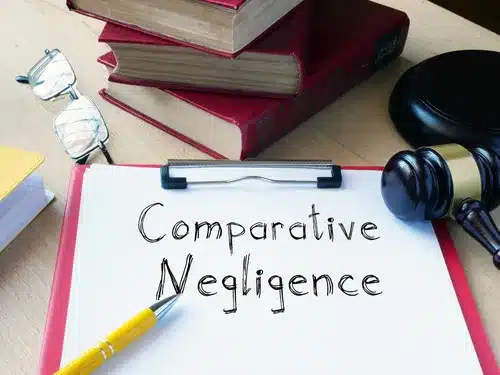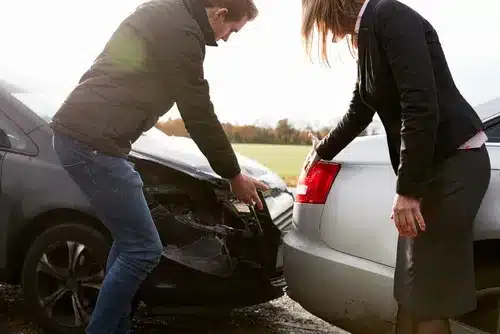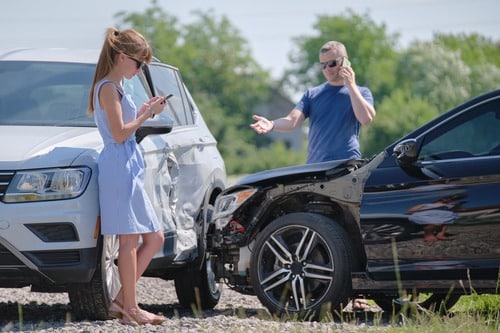After a car accident in Georgia, understanding comparative negligence is key to protecting your rights. Georgia is a modified comparative negligence state, so if you’re partially at fault for the accident, it could affect your ability to get damages. If you’re less than 50% at fault, you can still get compensation – just not as much as you would have if you were 0% at fault.
This blog will explain comparative negligence in Georgia and how shared fault impacts compensation in a car accident case. You should work with an experienced car accident lawyer to ensure fault is assigned fairly and to maximize compensation.
What Is Comparative Negligence in Georgia?
When a car accident happens, determining who is responsible is crucial for deciding how much compensation each driver should receive. Georgia follows a legal principle called “comparative negligence” to assign responsibility in car accident cases. Comparative negligence means that more than one person can be at fault for a car crash, and their compensation may be adjusted based on their level of responsibility.
The state’s modified comparative negligence rule is outlined in Georgia Code § 51-12-33. In simple terms, the law means an injured person can recover compensation if they are less than 50% at fault for the accident. However, if they are found to be 50% or more at fault, they are not entitled to compensation.
How Comparative Negligence Affects Car Accident Compensation
Comparative negligence directly impacts the compensation a car accident victim can receive. Insurance companies and courts consider the percentage of fault assigned to each party and adjust the final settlement or court award accordingly.
Georgia follows a “modified comparative negligence” rule. This means an accident victim can recover compensation if they are less than 50% at fault, but the amount will be reduced based on their share of blame for the collision.
For example, imagine Driver A is 20% responsible and Driver B is 80% responsible. Driver A can still receive compensation, but their payout will be reduced by 20%. If Driver A’s damages are $100,000, they would receive $80,000 instead of the full amount. Driver A’s insurance would pay nothing to Driver B.
Insurance companies use comparative negligence rules to reduce payouts. If they prove that a victim shares some blame for the accident, they will lower the settlement amount. They don’t have to pay anything if the victim is at least 50% at fault. This is why insurance companies often try to shift blame onto the injured party.
Example Scenarios
To better understand how comparative negligence works, let’s look at a few hypothetical situations:
- Scenario 1: A Distracted Driver and a Speeding Driver
If Driver A is texting while driving and Driver B is speeding, both could be found partially at fault for an accident. If Driver A is found to be 40% at fault and Driver B is 60% at fault, Driver A can still recover 60% of their damages. But Driver B is not entitled to recover compensation. - Scenario 2: A Rear-End Collision with Fault on Both Sides
If Driver A stops suddenly without a valid reason and Driver B is following too closely, both may share the blame. If Driver A is assigned 25% fault and Driver B 75% fault, Driver A can recover 75% of their damages.
How Fault is Determined After a Car Accident in Georgia
Determining fault in a car accident is crucial in the claims process. Georgia is an at-fault state, meaning that the at-fault driver’s insurance company must pay the victim after an accident.
If a driver behaves negligently, meaning they don’t show the kind of caution a responsible driver would, they can be held responsible for causing an accident. Some common examples of negligence include distracted driving, speeding, drunk driving, and running a red light.
Insurance Company Investigations
After an accident, insurance companies assign adjusters to investigate. They examine police reports, witness statements, and physical evidence such as vehicle damage and skid marks. Sometimes, they may use accident reconstruction experts.
The Importance of Evidence
Gathering strong evidence is essential to establishing fault. Photos and videos of the accident scene, dashcam footage, and traffic camera recordings can provide critical proof. Witness statements and police reports also play a significant role in determining who was at fault.
Disputes Over Fault
Sometimes, the parties involved in an accident disagree on who was responsible or how much blame each driver should bear. This can prolong settlement negotiation, a process where lawyers and insurance companies debate how much money an accident victim should receive.
If a settlement can’t be reached, the case may go to court, and a judge or jury will determine fault percentages and compensation.
Protecting Your Rights
Since insurance companies often try to increase a victim’s fault percentage to reduce their payout, it’s important to gather strong evidence. Here are some steps to take after an accident:
- Take Photos and Videos: Capture the scene, vehicle damage, skid marks, traffic signs, and any visible injuries.
- Get Witness Statements: Witnesses can help establish what happened and support your case if the other driver’s insurance company unfairly blames you.
- Request a Police Report: The report can provide an unbiased account of the accident.
- Do Not Admit Fault: Avoid saying things that can be interpreted as accepting blame. When talking to the police, stick to the facts and let them assess who is responsible.
- Be Careful What You Say: The other driver’s insurance company can use your words against you. Inform them of the accident, but don’t provide a statement before speaking to a lawyer.
- Seek Legal Help: A car accident attorney can challenge unfair fault assignments and help maximize compensation.
How a Georgia Car Accident Lawyer Can Help
If you’ve been in a car accident and the other driver’s insurance company claims you are partially at fault, the legal process can quickly become complex and challenging. You need an experienced car accident lawyer like those at Joe Durham Jr., P.C. in your corner.
A lawyer will meticulously collect evidence to support your claim such as the police report, witness statements, and footage from traffic or surveillance cameras near the accident. An attorney may also work with accident reconstruction specialists who use scientific methods to analyze the accident scene, vehicle damage, skid marks, and other physical evidence.
Experienced attorneys can spot and undermine insurance companies’ efforts to blame innocent accident victims. A lawyer will stand up to the other driver’s insurance company and advocate for the full compensation you deserve. If the insurer exaggerates your role in the accident, they will push back to lower your fault percentage.
If negotiations with the insurance company do not result in a fair settlement, your lawyer can file a lawsuit and take your case to court.
Contact Us Today for a Free Case Review
Comparative negligence in Georgia affects how much compensation a car accident victim can receive. It’s common for insurance companies to unfairly blame an accident victim or exaggerate the victim’s level of fault to reduce settlements or deny claims.
If you’re accused of sharing fault in a car accident, having a dedicated Georgia personal injury attorney from Joe Durham Jr., P.C. on your side can significantly impact the outcome of your case. Our legal team has the experience to fight for the compensation you deserve. We handle all aspects of your case so you can focus on your recovery.
Call 229-210-6226 or contact us online for a free consultation!








